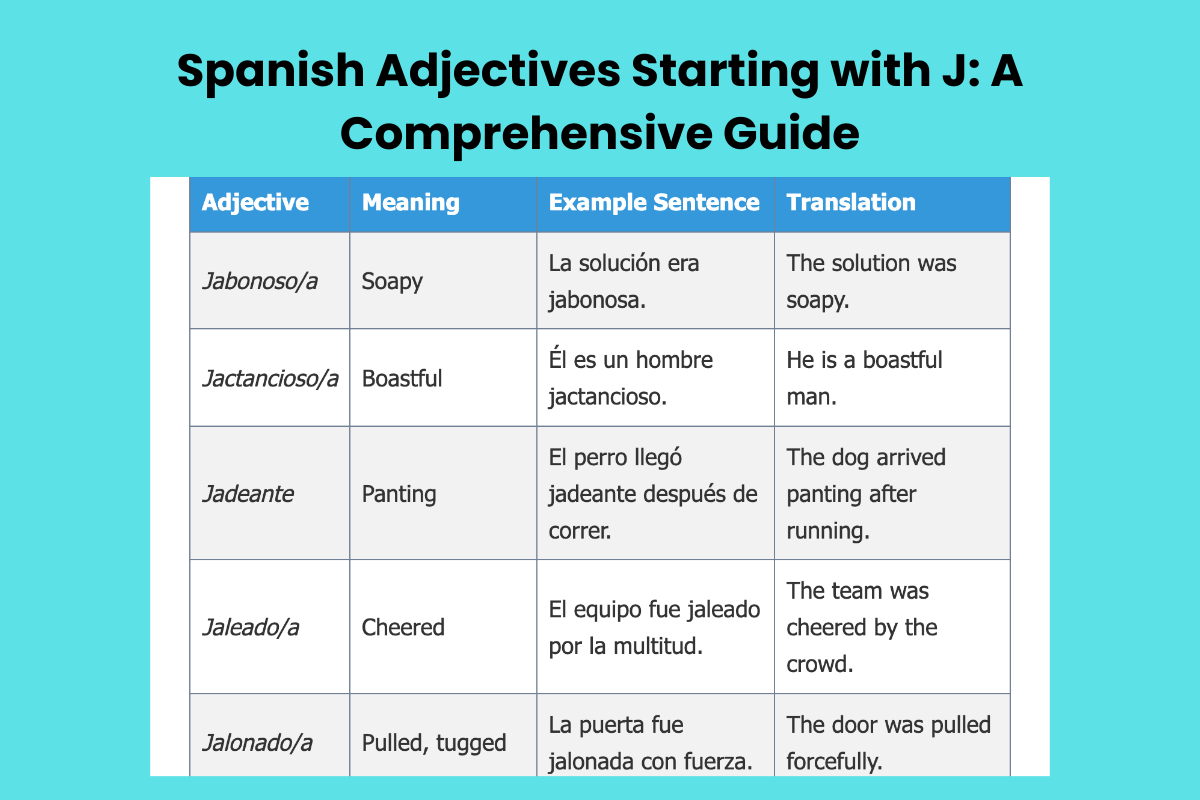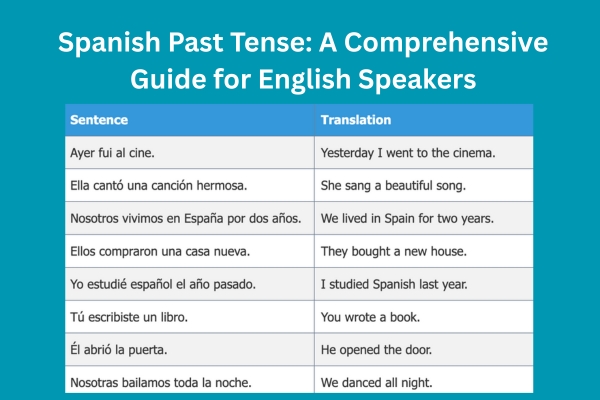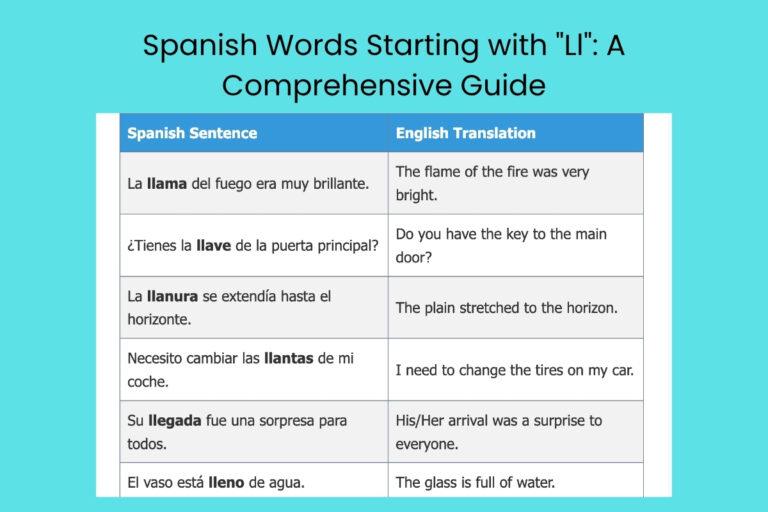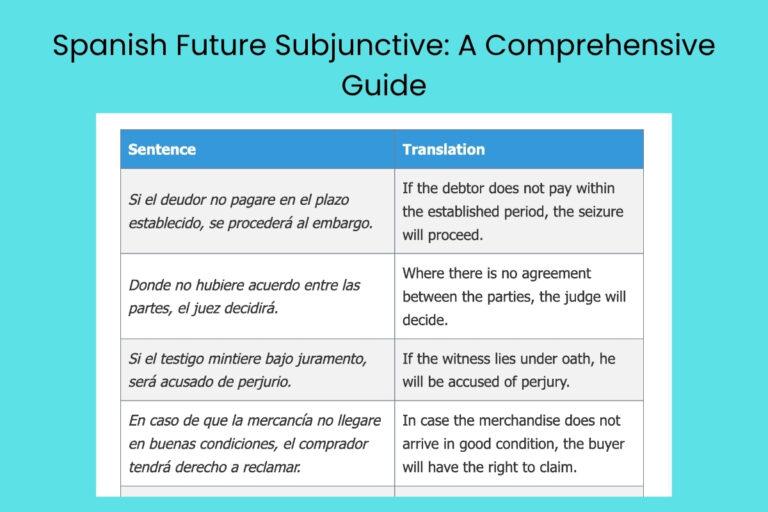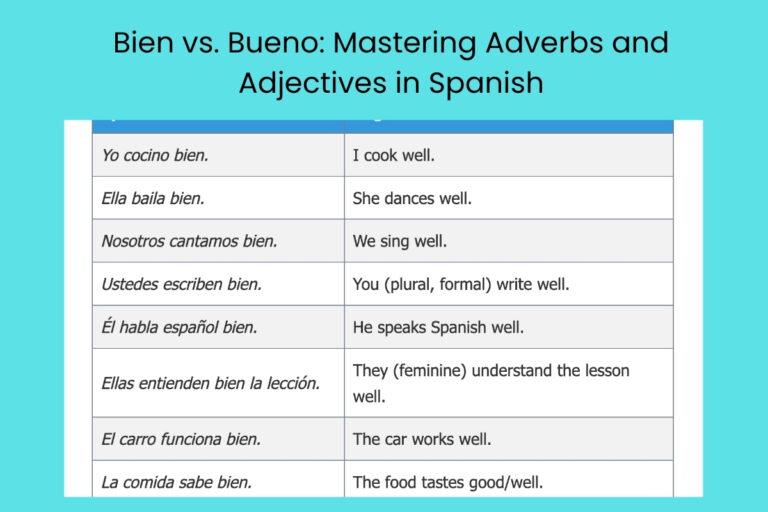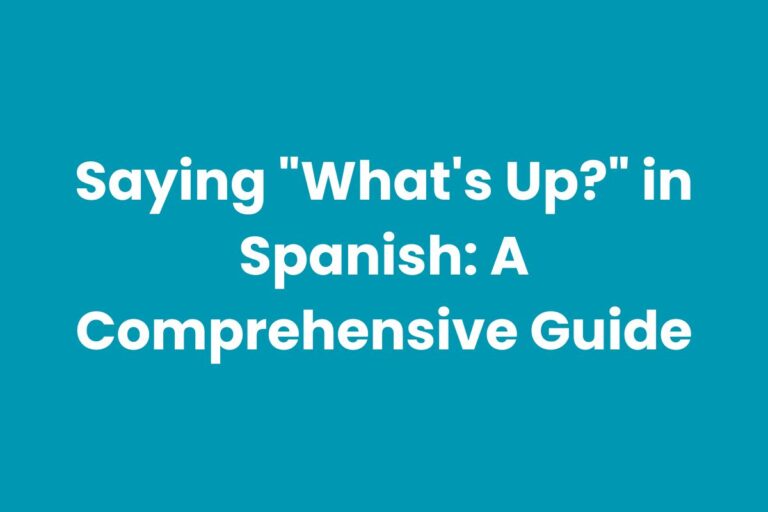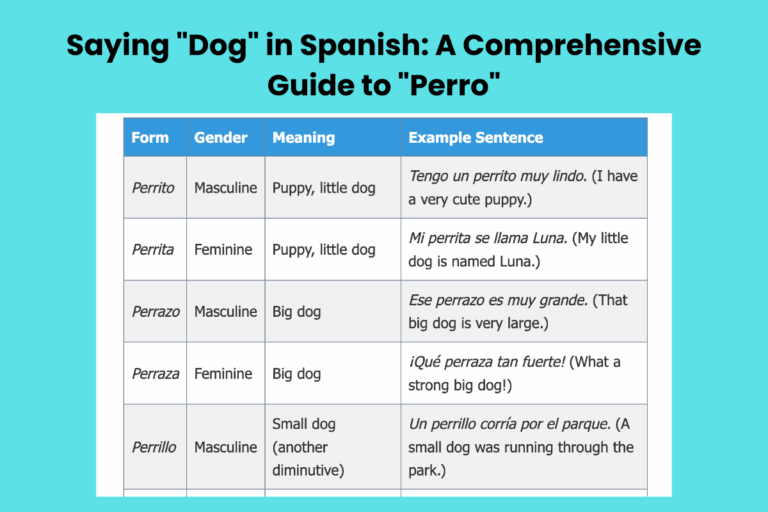Spanish Adjectives Starting with J: A Comprehensive Guide
Understanding adjectives is crucial for adding detail and nuance to your Spanish. This article focuses specifically on adjectives that begin with the letter “J,” providing a detailed exploration of their meanings, usage, and grammatical considerations.
Mastering these adjectives will enhance your descriptive abilities and overall fluency in Spanish. This guide is suitable for Spanish learners of all levels, from beginners seeking to expand their vocabulary to advanced students aiming to refine their grammatical precision.
Table of Contents
- Introduction
- Definition of Adjectives in Spanish
- Structural Breakdown of Spanish Adjectives
- Types and Categories of Spanish Adjectives
- Examples of Spanish Adjectives Starting with J
- Usage Rules for Spanish Adjectives
- Common Mistakes with Spanish Adjectives
- Practice Exercises
- Advanced Topics
- Frequently Asked Questions
- Conclusion
Definition of Adjectives in Spanish
In Spanish, an adjective (adjetivo) is a word that modifies a noun or pronoun, providing more information about its qualities or characteristics. Adjectives describe things, indicating what kind, how many, what color, or other qualities. They are essential for creating vivid and detailed descriptions in Spanish, similar to their role in English.
Classification of Adjectives
Adjectives in Spanish can be classified in several ways, including by their meaning (descriptive, quantitative, etc.) and by their form (variable or invariable). Descriptive adjectives are the most common, expressing qualities like size, color, or personality. Quantitative adjectives specify quantity, such as mucho (much) or poco (little).
Function of Adjectives
The primary function of an adjective is to modify a noun or pronoun. This modification can occur in two main ways: by directly preceding the noun (though less common in Spanish than in English) or by following the noun. Adjectives can also function as predicate adjectives, following a linking verb (like ser or estar) to describe the subject of the sentence.
Contexts of Adjective Use
Adjectives are used in virtually every type of communication in Spanish, from casual conversation to formal writing. They are crucial for describing people, places, things, and ideas.
Understanding how to use adjectives correctly is fundamental for effective communication and comprehension in Spanish.
Structural Breakdown of Spanish Adjectives
Spanish adjectives exhibit specific structural characteristics that differ from English. One of the most important is gender and number agreement with the nouns they modify.
This means the form of the adjective must change to match the gender (masculine or feminine) and number (singular or plural) of the noun.
Gender Agreement
Most Spanish adjectives have masculine and feminine forms. Typically, the masculine form ends in “-o,” and the feminine form ends in “-a.” For example, alto (tall – masculine) becomes alta (tall – feminine). However, some adjectives end in “-e” or a consonant, and these often have the same form for both genders. For example, inteligente (intelligent) is used for both masculine and feminine nouns. The gender of the noun determines which form of the adjective is used.
Number Agreement
Adjectives must also agree in number with the nouns they modify. If the noun is singular, the adjective must be singular; if the noun is plural, the adjective must be plural. To make most adjectives plural, add “-s” if the adjective ends in a vowel, or “-es” if it ends in a consonant. For example, alto (tall) becomes altos (tall – plural), and fácil (easy) becomes fáciles (easy – plural).
Position of Adjectives
While in English, adjectives generally precede the noun, in Spanish, they usually follow the noun. However, certain adjectives, especially those expressing inherent qualities or subjective opinions, may precede the noun for emphasis or stylistic effect.
The position can sometimes change the meaning of the adjective.
Types and Categories of Spanish Adjectives
Spanish adjectives can be categorized based on their meaning and function within a sentence. Understanding these categories can help you choose the appropriate adjective for a given context and use it correctly.
Descriptive Adjectives
Descriptive adjectives are the most common type, expressing qualities or characteristics of a noun. These adjectives can describe physical attributes, personality traits, or any other observable feature. Examples include rojo (red), grande (big), and simpático (friendly).
Quantitative Adjectives
Quantitative adjectives specify the quantity or amount of a noun. These can be definite (e.g., tres – three) or indefinite (e.g., muchos – many). They provide information about how much or how many of something there is. Other examples include poco (little), bastante (enough), and ninguno (none).
Possessive Adjectives
Possessive adjectives indicate ownership or possession. These adjectives agree in gender and number with the noun being possessed, not the possessor. Examples include mi (my), tu (your), su (his/her/its/their/your formal).
Demonstrative Adjectives
Demonstrative adjectives point out specific nouns, indicating their location or proximity to the speaker. Examples include este (this), ese (that), and aquel (that over there). These adjectives also agree in gender and number with the nouns they modify.
Interrogative Adjectives
Interrogative adjectives are used in questions to ask about the qualities or characteristics of a noun. The most common interrogative adjectives are qué (what) and cuál (which). For example, ¿Qué libro prefieres? (What book do you prefer?).
Examples of Spanish Adjectives Starting with J
This section provides examples of Spanish adjectives that begin with the letter “J,” illustrating their meanings and usage in various contexts. Each adjective is presented with a definition and example sentences to demonstrate its application.
Table 1: Common Adjectives Starting with J
The following table provides examples of adjectives starting with the letter J, their meanings and example sentences.
| Adjective | Meaning | Example Sentence | Translation |
|---|---|---|---|
| Jabonoso/a | Soapy | La solución era jabonosa. | The solution was soapy. |
| Jactancioso/a | Boastful | Él es un hombre jactancioso. | He is a boastful man. |
| Jadeante | Panting | El perro llegó jadeante después de correr. | The dog arrived panting after running. |
| Jaleado/a | Cheered | El equipo fue jaleado por la multitud. | The team was cheered by the crowd. |
| Jalonado/a | Pulled, tugged | La puerta fue jalonada con fuerza. | The door was pulled forcefully. |
| Jamaiquino/a | Jamaican | La música jamaiquina es muy popular. | Jamaican music is very popular. |
| Japonés/a | Japanese | El coche japonés es muy eficiente. | The Japanese car is very efficient. |
| Jardinero/a | Gardening, gardener-like | Tenía guantes jardineros. | He had gardening gloves. |
| Jaroso/a | Full of rockroses | El campo era jaroso en primavera. | The field was full of rockroses in spring. |
| Jaspeado/a | Marbled | La mesa tenía un diseño jaspeado. | The table had a marbled design. |
| Javanés/a | Javanese | El baile javanés es muy elegante. | Javanese dance is very elegant. |
| Jefe/a | Chief, leading | El ingeniero jefe dirigió el proyecto. | The chief engineer led the project. |
| Jerárquico/a | Hierarchical | La organización tiene una estructura jerárquica. | The organization has a hierarchical structure. |
| Jerigonza | Gibberish | Hablaba en jerigonza. | He was speaking gibberish. |
| Jesuítico/a | Jesuitical | La escuela era jesuítica. | The school was Jesuitical. |
| Jocoso/a | Jocular, humorous | Tenía un tono jocoso. | He had a jocular tone. |
| Jónico/a | Ionian | La columna era jónica. | The column was Ionian. |
| Jordano/a | Jordanian | La cultura jordana es fascinante. | Jordanian culture is fascinating. |
| Jorobado/a | Hunchbacked | El anciano era jorobado. | The old man was hunchbacked. |
| Joven | Young | Ella es una mujer joven. | She is a young woman. |
| Jovial | Jovial, cheerful | Su actitud era jovial y amigable. | His attitude was jovial and friendly. |
| Jubilado/a | Retired | El profesor jubilado escribía un libro. | The retired professor was writing a book. |
| Judicial | Judicial | El proceso judicial fue largo. | The judicial process was long. |
| Judío/a | Jewish | La comunidad judía es muy unida. | The Jewish community is very close-knit. |
| Jugoso/a | Juicy | La fruta era jugosa y dulce. | The fruit was juicy and sweet. |
| Juicioso/a | Judicious, sensible | Ella tomó una decisión juiciosa. | She made a judicious decision. |
| Juliano/a | Julian | El calendario juliano fue reemplazado. | The Julian calendar was replaced. |
| Juncoso/a | Reedy, rushy | El terreno era juncoso cerca del río. | The terrain was reedy near the river. |
| Juniperino/a | Juniper | El aroma era juniperino y fresco. | The aroma was juniper and fresh. |
| Junto/a | Together, joint | Tenemos un proyecto junto. | We have a joint project. |
| Jurídico/a | Juridical, legal | El asunto es de carácter jurídico. | The matter is of a juridical nature. |
| Justiciero/a | Avenging, justice-seeking | El héroe es un justiciero. | The hero is an avenger. |
| Justificable | Justifiable | Su acción no es justificable. | His action is not justifiable. |
| Justo/a | Just, fair, right | Es una decisión justa. | It’s a fair decision. |
| Juvenil | Juvenile, youthful | La moda juvenil es muy colorida. | Youthful fashion is very colorful. |
Table 2: Adjectives Starting with J – Describing People
This table focuses on adjectives starting with “J” that are commonly used to describe people, their characteristics, and their origins.
| Adjective | Meaning | Example Sentence | Translation |
|---|---|---|---|
| Jactancioso/a | Boastful | Es un hombre jactancioso, siempre alardeando. | He is a boastful man, always bragging. |
| Japonés/a | Japanese | Mi amiga japonesa es muy talentosa. | My Japanese friend is very talented. |
| Jefe/a | Chief, leading | La enfermera jefe es muy respetada. | The chief nurse is very respected. |
| Jocoso/a | Jocular, humorous | El payaso era jocoso y divertido. | The clown was jocular and funny. |
| Joven | Young | La joven estudiante es muy inteligente. | The young student is very intelligent. |
| Jovial | Jovial, cheerful | El anciano era jovial y lleno de vida. | The old man was jovial and full of life. |
| Judío/a | Jewish | La familia judía celebra Hanukkah. | The Jewish family celebrates Hanukkah. |
| Juicioso/a | Judicious, sensible | Ella es una consejera juiciosa. | She is a sensible advisor. |
| Justiciero/a | Avenging, justice-seeking | El héroe justiciero luchó contra la corrupción. | The avenging hero fought against corruption. |
| Justo/a | Just, fair | El juez es un hombre justo y honesto. | The judge is a just and honest man. |
| Jubilado/a | Retired | El contable jubilado se dedicó a la jardinería. | The retired accountant dedicated himself to gardening. |
| Jalonado/a | Harassed, bothered | El entrevistado se sintió jalonado. | The interviewee felt harassed. |
| Jadeante | Panting | El corredor llegó jadeante a la meta. | The runner arrived panting at the finish line. |
| Jarocho/a | From Veracruz, Mexico | El músico jarocho tocó el arpa. | The musician from Veracruz played the harp. |
| Jorobado/a | Hunchbacked | El personaje jorobado vivía en la torre. | The hunchbacked character lived in the tower. |
| Justificable | Justifiable | Su enojo no era justificable. | His anger wasn’t justifiable. |
| Juvenil | Youthful | Su apariencia juvenil sorprendía a todos. | His youthful appearance surprised everyone. |
| Jactancioso/a | Boastful | El vendedor jactancioso intentó engañarnos. | The boastful salesman tried to trick us. |
| Juerguista | Reveler | El grupo juerguista cantaba a todo pulmón. | The reveler group sang at the top of their lungs. |
| Jerárquico/a | Hierarchical | El sistema jerárquico era muy rígido. | The hierarchical system was very rigid. |
| Jerigonza | Speaking gibberish | El niño hablaba jerigonza. | The boy was speaking gibberish. |
| Jesuítico/a | Jesuitical | El profesor jesuítico era muy sabio. | The Jesuit professor was very wise. |
| Jaleado/a | Cheered on | El atleta jaleado ganó la carrera. | The cheered-on athlete won the race. |
| Jardinero/a | Gardener | El jardinero era muy amable. | The gardener was very friendly. |
| Jónico/a | Ionian | El filósofo jónico era famoso. | The Ionian philosopher was famous. |
| Jordano/a | Jordanian | La princesa jordana visitó el museo. | The Jordanian princess visited the museum. |
| Judicial | Judicial | El abogado judicial era muy conocido. | The judicial lawyer was well-known. |
Table 3: Adjectives Starting with J – Describing Objects or Situations
This table includes adjectives from the letter J that are frequently used to describe objects, situations, or abstract concepts.
| Adjective | Meaning | Example Sentence | Translation |
|---|---|---|---|
| Jabonoso/a | Soapy | El agua estaba jabonosa. | The water was soapy. |
| Japonés/a | Japanese | El arte japonés es muy elegante. | Japanese art is very elegant. |
| Jaspeado/a | Marbled | El piso tenía un diseño jaspeado. | The floor had a marbled design. |
| Jerárquico/a | Hierarchical | La estructura jerárquica de la empresa es compleja. | The hierarchical structure of the company is complex. |
| Judicial | Judicial | El sistema judicial es fundamental para la justicia. | The judicial system is fundamental for justice. |
| Jugoso/a | Juicy | La historia era jugosa y llena de detalles. | The story was juicy and full of details. |
| Jurídico/a | Juridical, legal | El aspecto jurídico del contrato es importante. | The juridical aspect of the contract is important. |
| Justificable | Justifiable | La decisión no era justificable. | The decision was not justifiable. |
| Justo/a | Just, fair | El precio es justo para ambos. | The price is fair for both. |
| Juvenil | Juvenile | La ropa juvenil es muy moderna. | Juvenile clothing is very modern. |
| Jaleado/a | Supported | El proyecto fue jaleado por todos. | The project was supported by everyone. |
| Jalonado/a | Pulled | El cable estaba jalonado por el viento. | The cable was pulled by the wind. |
| Jaroso/a | Full of rockroses | El paisaje era jaroso y hermoso. | The landscape was full of rockroses and beautiful. |
| Javanés/a | Javanese | La cultura javanesa es rica en tradiciones. | Javanese culture is rich in traditions. |
| Jocoso/a | Humorous | El comentario era jocoso y divertido. | The comment was humorous and funny. |
| Jónico/a | Ionian | La arquitectura jónica es impresionante. | Ionian architecture is impressive. |
| Juniperino/a | Juniper | El aroma era juniperino y refrescante. | The aroma was juniper and refreshing. |
| Jubiloso/a | Joyful | La noticia era jubilosa para todos. | The news was joyful for everyone. |
| Jactancioso/a | Boastful | El tono jactancioso era irritante. | The boastful tone was irritating. |
| Jerigonza | Gibberish | La explicación era jerigonza para mí. | The explanation was gibberish to me. |
| Jesuítico/a | Jesuitical | El método jesuítico era riguroso. | The Jesuit method was rigorous. |
| Joven | Young | La generación joven tiene mucho potencial. | The young generation has a lot of potential. |
| Jordano/a | Jordanian | La comida jordana es deliciosa. | Jordanian food is delicious. |
Usage Rules for Spanish Adjectives
Using Spanish adjectives correctly involves understanding a few key rules related to agreement, placement, and specific adjective behaviors.
Agreement with Nouns
As previously mentioned, adjectives must agree in gender and number with the nouns they modify. This is a fundamental rule that must be followed consistently.
For example, if you are describing a masculine singular noun, you must use the masculine singular form of the adjective.
Placement of Adjectives
While adjectives typically follow the noun in Spanish, there are exceptions. Adjectives that express inherent qualities or subjective opinions can precede the noun. Additionally, certain adjectives change their meaning depending on their position. For example, un gran hombre (a great man) is different from un hombre grande (a big man).
Irregular Adjectives
Some adjectives have irregular forms or behaviors. For example, some adjectives shorten when they precede a masculine singular noun. The adjective bueno (good) becomes buen before a masculine singular noun, as in un buen día (a good day).
Common Mistakes with Spanish Adjectives
Learners often make predictable mistakes when using Spanish adjectives. Recognizing these common errors can help you avoid them and improve your accuracy.
Incorrect Gender Agreement
One of the most common mistakes is using the wrong gender form of an adjective. For example, saying el casa blanca (incorrect) instead of la casa blanca (the white house). The adjective must agree with the feminine noun casa.
Incorrect Number Agreement
Another frequent error is failing to make the adjective plural when the noun is plural. For example, saying los libro interesante (incorrect) instead of los libros interesantes (the interesting books). The adjective must agree with the plural noun libros.
Incorrect Placement
Placing an adjective before a noun when it should follow (or vice versa) can also lead to errors. While sometimes acceptable for emphasis, doing so without understanding the nuances of adjective placement can result in awkward or incorrect sentences.
Correct vs. Incorrect Examples:
| Incorrect | Correct | Explanation |
|---|---|---|
| El problema grande | El gran problema (or El problema grande with different emphasis) | Placement affects meaning; “gran” before the noun implies “great” in importance. |
| La hombre alto | El hombre alto | Gender agreement: “hombre” is masculine, so the article must be “el.” |
| Las casas es bonito | Las casas son bonitas | Both number and gender agreement are wrong; should be plural and feminine. |
Practice Exercises
Test your understanding of Spanish adjectives with these practice exercises. Fill in the blanks with the correct form of the adjective provided in parentheses.
Exercise 1: Gender and Number Agreement
Complete the following sentences by choosing the correct form of the adjective in parentheses.
| Sentence | Adjective (Infinitive Form) | Your Answer |
|---|---|---|
| La casa es _____. (blanco) | blanco | _________ |
| Los libros son _____. (interesante) | interesante | _________ |
| El coche es _____. (rápido) | rápido | _________ |
| Las flores son _____. (bonito) | bonito | _________ |
| El hombre es _____. (alto) | alto | _________ |
| La niña es _____. (joven) | joven | _________ |
| Los estudiantes son _____. (inteligente) | inteligente | _________ |
| La comida es _____. (jugoso) | jugoso | _________ |
| Los problemas son _____. (jurídico) | jurídico | _________ |
| El árbol es _____. (juncoso) | juncoso | _________ |
Answer Key:
| Sentence | Your Answer |
|---|---|
| La casa es _____. (blanco) | blanca |
| Los libros son _____. (interesante) | interesantes |
| El coche es _____. (rápido) | rápido |
| Las flores son _____. (bonito) | bonitas |
| El hombre es _____. (alto) | alto |
| La niña es _____. (joven) | joven |
| Los estudiantes son _____. (inteligente) | inteligentes |
| La comida es _____. (jugoso) | jugosa |
| Los problemas son _____. (jurídico) | jurídicos |
| El árbol es _____. (juncoso) | juncoso |
Exercise 2: Adjective Placement
Rewrite the following sentences, placing the adjective in the most appropriate position. Note that some sentences may have more than one correct answer, depending on the intended meaning.
| Sentence | Your Answer |
|---|---|
| El hombre alto es mi amigo. | _________ |
| La casa blanca es hermosa. | _________ |
| El coche rojo es rápido. | _________ |
| Tengo un amigo bueno. | _________ |
| Es una problema grande. | _________ |
| Es una persona jactancioso. | _________ |
| La comida jugoso es deliciosa. | _________ |
| La situación jurídico es complicada. | _________ |
| Tenemos un proyecto junto. | _________ |
| Es un chico joven. | _________ |
Answer Key:
| Sentence | Your Answer |
|---|---|
| El hombre alto es mi amigo. | El hombre alto es mi amigo. (or El alto hombre es mi amigo, depending on emphasis) |
| La casa blanca es hermosa. | La casa blanca es hermosa. |
| El coche rojo es rápido. | El coche rojo es rápido. |
| Tengo un amigo bueno. | Tengo un buen amigo. |
| Es una problema grande. | Es un gran problema. (or Es un problema grande, depending on emphasis) |
| Es una persona jactancioso. | Es una persona jactanciosa. |
| La comida jugoso es deliciosa. | La jugosa comida es deliciosa. |
| La situación jurídico es complicada. | La situación jurídica es complicada. |
| Tenemos un proyecto junto. | Tenemos un proyecto junto. |
| Es un chico joven. | Es un chico joven. |
Advanced Topics
For advanced learners, exploring more nuanced aspects of Spanish adjectives can further refine their language skills.
Adjective Clauses
Adjective clauses, also known as relative clauses, function as adjectives by modifying nouns or pronouns. These clauses are introduced by relative pronouns such as que (that/which/who), quien (who), and cual (which). Understanding how to construct and use adjective clauses is essential for creating complex and detailed sentences.
Subjunctive Mood with Adjectives
In certain contexts, adjectives can trigger the use of the subjunctive mood in dependent clauses. This typically occurs when the adjective expresses doubt, uncertainty, or a subjective opinion.
For example, “Busco un libro que sea interesante” (I’m looking for a book that is interesting).
Comparative and Superlative Forms
Adjectives have comparative and superlative forms to express degrees of comparison. The comparative form compares two nouns (e.g., más alto que – taller than), while the superlative form indicates the highest degree of a quality (e.g., el más alto – the tallest).
Frequently Asked Questions
This section addresses common questions that learners have about Spanish adjectives.
- What is the difference between ser and estar when used with adjectives?
Ser is used to describe inherent or permanent characteristics, while estar is used to describe temporary states or conditions. For example, “Ella es inteligente” (She is intelligent)
describes a permanent trait, while “Ella está enferma” (She is sick) describes a temporary condition.
- How do you make an adjective plural in Spanish?
Generally, if an adjective ends in a vowel, add “-s” to make it plural. If it ends in a consonant, add “-es.” For example, alto becomes altos, and fácil becomes fáciles.
- Can the position of an adjective change its meaning?
Yes, the position of an adjective can sometimes change its meaning. For example, un gran hombre (a great man) is different from un hombre grande (a big man).
- What are some common irregular adjectives in Spanish?
Some common irregular adjectives include bueno (good), which becomes buen before masculine singular nouns, and adjectives that have irregular comparative and superlative forms, such as mejor (better) and peor (worse).
- How do I know when to use the subjunctive mood with adjectives?
Use the subjunctive mood in dependent clauses when the adjective expresses doubt, uncertainty, or a subjective opinion. For example, “Busco un libro que sea interesante” (I’m looking for a book that is interesting).
- What is an adjective clause, and how do I use it?
An adjective clause, also known as a relative clause, functions as an adjective by modifying nouns or pronouns. These clauses are introduced by relative pronouns such as que (that/which/who), quien (who), and cual (which). Use them to add detail and specify which noun you’re referring to. For example, “El libro que leí ayer fue fascinante” (The book that I read yesterday was fascinating).
Conclusion
Mastering Spanish adjectives, especially those starting with the letter “J,” can significantly enhance your ability to express yourself clearly and accurately in Spanish. By understanding the rules of agreement, placement, and usage, and by practicing regularly, you can avoid common mistakes and communicate more effectively.
Continue to expand your vocabulary and explore advanced topics to further refine your language skills and achieve fluency in Spanish.

